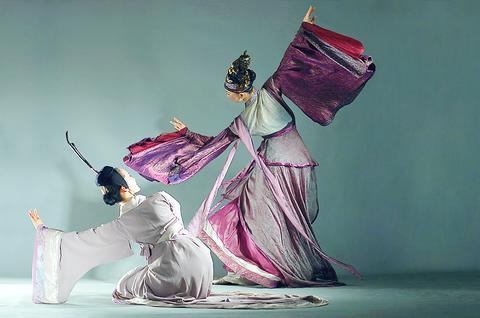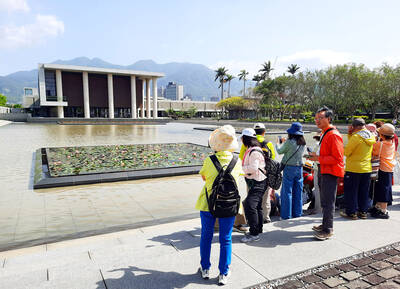The National Concert Hall (
Set in the Kingdom of Wei (魏), which from 220 to 265AD was one of the Three Kingdoms (三國時代), Tsao Pi and Chen Mi employs a mixture of factual and fictional events in order to weave together a melodramatic triangle of love, jealousy and power between the emperor, Tsao Pi (曹丕), his brother, the scholar Tsao Zhi (曹植) and the beautiful maiden Chen Mi (甄宓).
The plot revolves around the emperor and his brother's passion for Chen Mi. Insanely jealous of Chen's love for his brother, the emperor at first plans to murder his own kin. Escaping his brother's murderous wrath by composing a poem, the famous Seven Step Poem (七步詩), the scholar is able to continue his relationship with Chen. Fate, however, intervenes, when, unable to kill his brother the emperor decides to murder the beautiful Chen instead.

PHOTO COURTESY OF CKS CULTURAL CENTER
One of the nation's leading choreographers of historical dance, Lin has spent much of the past 30 years poring over scarce historical records that are often vague and difficult to interpret, in order to authentically recreate the music and dance of ancient China. The results of Lin's breakthrough finds have enabled her to successfully stage what many scholars believe to be some of the most breathtaking and accurate reproductions of antiquated dance ever performed on the contemporary stage.
For her latest venture, however, Lin has created a breathtaking four-act dance production that employs a mixture of both precise classical and stylized modern dance routines to recreate the events that took place nearly 2,000 years ago in the Kingdom of Wei.
Like Lin's dance routines, Wong's score is also part classical and part contemporary. Although the core of Wong's compositions are modern he makes ample use of the Chinese sitar and other classical Chinese instruments to bring new life to the age-old tale. Interwoven into this already weird and wonderful musical jumble are aspects of Beijing Opera, Cantonese classical music and traditional Chinese folk music.

Historical purists might find some of the events that unfold on the stage of the National Theatre this weekend hard to swallow, but fans of classical opera and modern dance alike will find that Taipei Chinese Orchestra and Neo-Classical Dance Company's stylized joint production is hugely entertaining.
Performance notes:

What: The Taipei Chinese Orchestra and Neo-Classical Dance Company's production of Tsao Pi and Chen Mi
Where: The National Theatre (
When: At 7:30pm tonight and tomorrow. There will be a matinee performance at 2:30pm on Sunday, May 9
Cost: Between NT$300 and NT$1,500 and are available from the CKS Cultural Center booking office

When the South Vietnamese capital of Saigon fell to the North Vietnamese forces 50 years ago this week, it prompted a mass exodus of some 2 million people — hundreds of thousands fleeing perilously on small boats across open water to escape the communist regime. Many ultimately settled in Southern California’s Orange County in an area now known as “Little Saigon,” not far from Marine Corps Base Camp Pendleton, where the first refugees were airlifted upon reaching the US. The diaspora now also has significant populations in Virginia, Texas and Washington state, as well as in countries including France and Australia.

On April 17, Chinese Nationalist Party (KMT) Chairman Eric Chu (朱立倫) launched a bold campaign to revive and revitalize the KMT base by calling for an impromptu rally at the Taipei prosecutor’s offices to protest recent arrests of KMT recall campaigners over allegations of forgery and fraud involving signatures of dead voters. The protest had no time to apply for permits and was illegal, but that played into the sense of opposition grievance at alleged weaponization of the judiciary by the Democratic Progressive Party (DPP) to “annihilate” the opposition parties. Blamed for faltering recall campaigns and faced with a KMT chair

Article 2 of the Additional Articles of the Constitution of the Republic of China (中華民國憲法增修條文) stipulates that upon a vote of no confidence in the premier, the president can dissolve the legislature within 10 days. If the legislature is dissolved, a new legislative election must be held within 60 days, and the legislators’ terms will then be reckoned from that election. Two weeks ago Taipei Mayor Chiang Wan-an (蔣萬安) of the Chinese Nationalist Party (KMT) proposed that the legislature hold a vote of no confidence in the premier and dare the president to dissolve the legislature. The legislature is currently controlled

Dull functional structures dominate Taiwan’s cityscapes. But that’s slowly changing, thanks to talented architects and patrons with deep pockets. Since the start of the 21st century, the country has gained several alluring landmark buildings, including the two described below. NUNG CHAN MONASTERY Dharma Drum Mountain (法鼓山, DDM) is one of Taiwan’s most prominent religious organizations. Under the leadership of Buddhist Master Sheng Yen (聖嚴), who died in 2009, it developed into an international Buddhist foundation active in the spiritual, cultural and educational spheres. Since 2005, DDM’s principal base has been its sprawling hillside complex in New Taipei City’s Jinshan District (金山). But